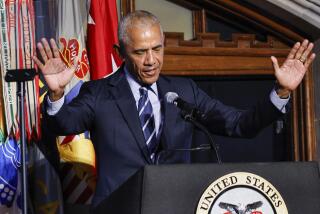‘92 DEMOCRATIC CONVENTION : Democratic Boys on Bus Head for Heartland : Campaign: Voicing a desire to ‘put people first,’ Clinton and Gore will make a six-day, eight-state tour following the convention.
- Share via
NEW YORK — Bill Clinton and Al Gore will roll away from the Democratic National Convention today in a lumbering caravan of buses that will land a few days later on the doorstep of tiny Utica, Ohio, where the visit is shaping up as the biggest news in the village since the sewer system blew up last month.
“We’re a quiet little bedroom community and nothing like this ever happens here,” said a surprised Larry Friesel, a full-time schoolteacher and part-time mayor of the town of 2,000.
The sewer explosion in mid-June gave Utica “some attention,” Friesel allowed. But nothing like this.
Four thousand cards have been mailed to Uticans and nearby villagers, inviting them to meet the new Democratic presidential nominee and his running mate. The local television station leaked word of the visit Wednesday night, and it was spreading mouth-to-ear all day Thursday, the mayor said.
“People like the fact that he is picking a small town like this. It’s a once-in-a-lifetime opportunity for a village this size,” said Friesel, talking on the telephone from his office, where he was studying plans for the new sewer line.
The town’s sense of awe-struck enthusiasm is precisely what Clinton aides had in mind in scheduling a six-day, populist extravaganza-by-bus, which they hope will be blessed with small-town imagery and cheering crowds.
While the final itinerary has not been released, preliminary plans have the Clinton caravan following a straightforward route west, beginning with a send-off rally in New York City and winding through eight states before it concludes in St. Louis Wednesday.
There is a method to the madness of having Clinton and Gore spend all of their waking hours in a moving behemoth: The states through which the Arkansas governor and Tennessee senator will roll represent 117 electoral votes, 43% of the 270 needed to win in November.
From time immemorial--and particularly since the television age--political candidates have seized on ways to get their message out in arenas that suggest they have a touch for regular folks, and the Clinton campaign has decided that bus rides are its ticket to that image.
Generally, such cavalcades are the purview of vice presidential candidates whom national strategists want to keep on the back roads--where they can theoretically do less harm.
Take, for example, Vice President Dan Quayle, who raised bus riding to an art form in 1988, once stopping his caravan in front of a gaggle of schoolchildren in rural Ohio to deliver this sage advice: “Now, if you study hard, if you work hard, someday, you never know, you might be taking a bus.”
He was joking. But Clinton aides say there is a serious undertow to trips like this.
“Putting people first,” said Jeff Eller, a Clinton spokesman, when asked what message the bus tour was meant to convey. “Investing in people.”
Not incidentally, “people first” emerged as a key Democratic slogan out of the convention. It was flashed on the giant television wall behind the podium throughout the proceedings here.
The Clinton campaign sees the bus trip as a means of suggesting to voters that the Arkansas governor is not a typical nominee running a typical campaign, heavy on airport arrivals, Chamber of Commerce luncheons and fund-raising dinners.
“He’s campaigning among real people and getting away from the Tarmac-to-Tarmac campaign,” Eller said.
The real people appeal may have increased its currency Thursday with the decision by Texas independent Ross Perot not to seek the presidency--a move that left up for grabs millions of Perot supporters who had been attracted by his outsider style.
Shortly after concluding the Midwestern trip, Clinton is expected to make a campaign swing through California and the Pacific Northwest, where Democratic officials are encouraging the candidate to reach out to suburban and rural voters as well as the party base in major cities.
Brad Sherman, a member of the California Board of Equalization and a Clinton delegate to the convention, said flatly that the nominee should get on a bus and tour the state.
“The one thing people don’t need is a reserved, self-important politician,” said Sherman.
Sherman, in seeking his seat in 1990, sought to appeal to populists by heading for county fairs and handing out blue combs that read, naturally enough, “Brad Sherman for Board of Equalization.”
“There is no such thing as too hokey,” Sherman declared.
More to Read
Get the L.A. Times Politics newsletter
Deeply reported insights into legislation, politics and policy from Sacramento, Washington and beyond. In your inbox twice per week.
You may occasionally receive promotional content from the Los Angeles Times.











